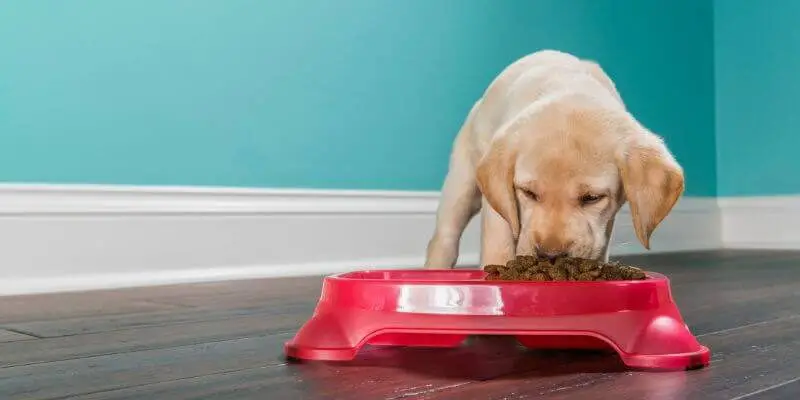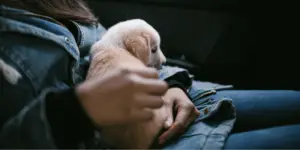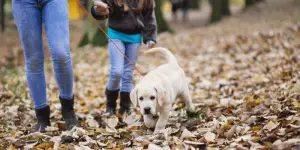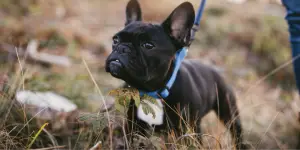
7 Week Puppy Development – What to Expect Onwards
Owning a 7-week-old puppy is exciting, but they need a lot of time, care, and attention. Dogs, especially when young, require a lot of work and commitment.
Puppies should still be with their mother and siblings until at least 8 weeks of age, but if you’re looking after an orphaned pup, a nursing female dog, or simply want to prepare for your pooch’s arrival, here’s everything you need to know about 7-week-old puppy development.
7-week-old puppy sleep schedules
Puppies need a lot more sleep than adult dogs, especially at 7 weeks old. Your pooch needs to get ample rest each day so they can grow up big and strong. You should set nap times for your pup daily to make sure they’re getting enough shut-eye.
During these periods, leave your puppy alone and try to be as quiet as possible to encourage them to sleep – a dog crate can come in handy for this! Most puppies sleep from 30 minutes to 2 hours at a time, so try not to disturb them while they’re resting.

How much sleep does a 7-week-old puppy need?
A 7-week-old puppy needs around 18 to 20 hours of sleep every day. Dogs are polyphasic sleepers, so they nap multiple times during 24 hours rather than in one long stretch at night.
Once your puppy is around 20 weeks old, the amount of sleep they need per day will decrease to around 15 hours. Adult dogs, on the other hand, normally only nap for between 8 to 13.5 hours a day.
7-week-old-puppy training
Although puppies at 7 weeks old and under are too young to undergo extensive training, you can still begin the basics. Simple commands like “sit”, “come”, and “down” can be learned at this age, as can teaching your puppy their name.
You can also start crate training your puppy and working on housebreaking, though don’t expect your pooch to fully grasp these concepts just yet. It can take several weeks or even months for dogs to be completely potty trained and consistently sleeping in a crate without crying/barking.
In addition, puppies at this age have extremely short attention spans, so it’s a good idea to keep training sessions short – 5 to 10 minutes at most. Make sure you offer your pup praise and a tasty treat (in moderation!) when training is going well.
7-week-old puppy behavior
A puppy at 7 weeks old is a lot like a human toddler – they’re playful, mischievous, and prone to a tantrum or two. At this age, the secondary socialization period begins. During this time, puppies are much more confident when approaching strangers and tackling new situations.
This is why it’s so important to start introducing your pup to new people and experiences as soon as possible.
Most puppies at 7 weeks old will have all of their baby teeth – it isn’t until 12 weeks old that these teeth start falling out and are replaced by adult teeth. It’s a good idea to start training your puppy not to chew on hands, feet, furniture, clothes, etc, as it can be an issue later on in life.
During this stage of development, social competition between littermates usually occurs. You might find your puppy “play fighting” with their siblings, which helps them learn crucial social and motor skills.
In addition, puppies around this age will be highly bonded with their mother and siblings, leading to extreme distress if they are separated from one another, even for a short time. However, once your puppy reaches 10 weeks old, this bond should have considerably decreased.
Lastly, between 6 to 7 weeks old, it’s not uncommon for puppies to strongly oppose being confined and restrained, such as being in a crate. This objection often manifests as high-pitched, long vocalizations.
As puppies mature, these vocalizations usually become less frequent and intense, so don’t let this put you off crate training your pooch.

7-week-old puppy feeding
Puppies at 7 weeks old should be fully weaned and solely on solid food. Meal times should be broken up into small but frequent portions throughout the day.
Pups have different dietary needs than adult dogs, so you’ll need to feed them good-quality dry or wet food targeted for puppies. Feeding your puppy adult dog food for a long period of time can result in malnourishment and digestive problems.
How much food should a 7-week-old puppy eat?
A 7-week-old puppy should be fed 4 times a day, though not all at once! You should break up your puppy’s meals throughout the day.
The amount of food you should feed your puppy depends on their size. As a general rule of thumb, around 20g of food per kg of body weight is usually sufficient.
Most commercial puppy food brands will list feeding guidelines on the back of the packaging.
How much water should a 7-week-old puppy drink?
Puppies generally require between 1 ounce of water per pound of body weight each day. So, for instance, if your pup weighs 8 pounds, they’ll need around 8 ounces of water daily.
Read our guide on what to do if your 7 week puppy is breathing fast in its sleep – what to look out for.

7-week-old-puppy socialization
Proper socialization is crucial for puppies, especially at 7 weeks of age, as it will influence the type of dog your puppy will grow into. You should allow your pup to meet family members, friends, and strangers as often as possible to increase their confidence and help them understand how to act around humans.
In addition, you should expose your puppy to new places and different experiences, such as bicycles, cars, prams/buggies, umbrellas, etc. Slowly accustom your puppy to things like being groomed, having nails trimmed, and wearing a harness/lead too.
If your puppy has had their second vaccination (and 2 weeks have passed since), you can begin introducing them to other dogs. Puppy classes in particular are a great way to let your pooch meet other puppies and humans.

Can my 7-week-old puppy meet other dogs?
Puppies shouldn’t meet other dogs until they have completed both their first and second vaccinations, which normally occur between 8 to 12 weeks of age.
Dogs can have their vaccinations as early as 4 weeks old, but you’ll still need to wait at least 2 weeks after your pooch has had their second vaccine before they can socialize with other dogs.
What does a 7-week-old puppy look like?
Aside from being very cute, puppies like miniature versions of their adult counterparts. Their fur is soft and they should have most of their baby teeth at this point.
Certain puppy breeds will have different coloration than their adult counterparts, such as the Yorkshire terrier. While young, Yorkie puppies have black and tan fur that gradually shifts to blue-gray and gold as they age.
7-week-old puppy health and care
There are other crucial components of your puppy’s care alongside feeding and socialization that you’ll need to do to keep them healthy.
This includes exercise, enrichment, grooming, and dental hygiene. Although puppies at 7 weeks of age won’t be able to go on long hikes quite yet, you can start walking them around your backyard for around 5 to 10 minutes a day.
Mental stimulation is key for your puppy’s well-being and helps prevent boredom and destructive behavior. Some great activities you can do to challenge your puppy’s mind include tug of war, fetch, obedience training, or simply letting your puppy play with chew toys.
Lastly, you’ll need to keep on top of your pup’s grooming needs, which includes brushing, bathing, teeth cleaning, and nail clipping.
Can I walk my 7-week-old-puppy outside?
Until your puppy has had their second vaccine, you should avoid walking them in public areas. However, you can let your puppy outside in an enclosed backyard.
7-week-old puppy schedule and routine
A consistent daily routine is useful for puppies as it not only lets your pooch know what to expect every day but also helps you keep on top of your puppy’s daily care.
Below is a sample 7-week-old puppy schedule you could use for your pooch.
Early Morning: The first thing you should do when you wake up is let your puppy outside to go potty. This will make the process of housebreaking your pup considerably easier. At 7 weeks old, your puppy can only hold their bladder for around 2 hours, so regular bathroom breaks are a must.
Breakfast: Once you’ve taken your puppy to relieve themselves, offer them their first meal of the day. Leave food down for 15 minutes, then remove it.
Potty Break: Dogs tend to need the toilet after a meal, so after your puppy has eaten, let them outside again. Afterward, you can fit in a training session or play some games with your puppy.
Mid-Morning: You can let your puppy rest for the rest of the morning – all that playing is tiring work!
Midday: After your puppy has woken up from their nap, take them outside again, and repeat the activities in the morning routine – meal, potty break, playtime/training, and another nap.
Afternoon: When your puppy has woken up from their second nap of the day, it’s time for another potty trip, then the third meal, playtime, or some cuddles.
Dinner: If possible, schedule your puppy’s meals around the time you prepare yours. That way, you can feed your puppy while you make your food, then let them play as you eat.
Evening: Potty break after dinner, then let your puppy settle down for at least an hour before bed. Keep noise to a minimum and dim the lights.
Bedtime: One last potty break, then take your puppy to their sleeping area without making a big fuss. They should be pretty sleepy as long as you’ve squeezed in plenty of activities during the day.
Potty Break: Your puppy will likely need the toilet during the night, so be sure to set a few alarms!
Final thoughts
Hopefully, this article helped you understand everything about your puppy’s 7-week-old development, as well as how to prepare for your new dog.
Bear in mind that the minimum age puppies should leave their mother and littermates is 8 weeks old. If someone offers you a puppy younger than this, then they are not a reputable or trustworthy breeder.
It’s important to do your research when choosing a dog breeder, as well as be on the lookout for warning signs like not being able to see your puppy’s parents.
References
- https://www.akc.org/expert-advice/health/how-much-do-puppies-sleep/#:~:text=Although%20puppies%20are%20little%20bundles,18%2D20%20hours%20a%20day.
- https://www.akc.org/expert-advice/training/setting-schedules-and-developing-a-routine-for-your-new-puppy/
- https://www.sleepfoundation.org/animals-and-sleep/how-much-do-dogs-sleep#:~:text=Adult%20Dogs%3A%20Most%20adult%20dogs,to%20eight%20hours%20of%20sleep.
- https://pethelpful.com/dogs/Stages-of-Growth-7-Week-Old-Puppy-Development

Written by: Joshua Gordon
Head of Research and Editorial, Joshua has over 7 years of experience as a finance and automotive research consultant. He is a childhood pet owner and dog enthusiast.










